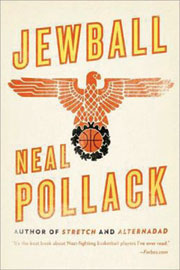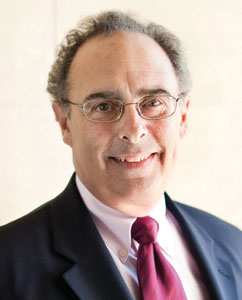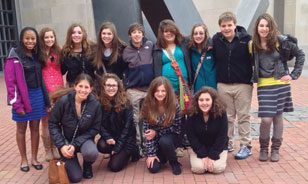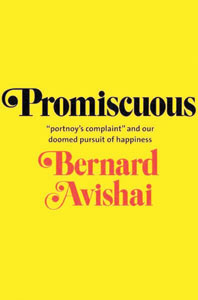Basketball and Nazis in the 1930s
“Jewball” by Neal Pollack, Thomas & Mercer, 2012, $14.95 Author Neal Pollack has scored a slam dunk with his fast-paced novel “Jewball.”
Author Neal Pollack has scored a slam dunk with his fast-paced novel “Jewball.”
Pollack has based the book on a real professional basketball team of the ’20s and ’30s, the Philadelphia Sphas (South Philadelphia Hebrew Association) who played in a barnstorming league. The author has written a whirlwind tale about a group of Jewish boys with talent who were threatened by the German-American Bund, and who outwitted these American Nazis both on the court and on their home turf.
The protagonist of the narrative is Inky Lautner, who in real life was, at 15, the youngest person ever to play professional basketball. In the novel, Inky is uneducated and poor and stupidly takes a side job as an enforcer for the Bund. It doesn’t take him long to realize his mistake and return to his fellow teammates. In the meantime, the team must deal with the fact that their manager Eddie Gottlieb has a gambling debt that was bought up by the Bund. To pay off the debt, the Sphas are expected to throw a game in Minneapolis to a German-American team who support Hitler’s theories of racial superiority.
On route to the novel’s final game, readers follow the team to Harlem, Brooklyn, Scranton, Pittsburgh and Chicago. They played for the most part in hotel ballrooms. After a game, they partied as hard and fast as they played. This road trip is filled with great basketball, profanity, sex, alcohol, and an occasional good night’s sleep. This page-turner keeps on scoring unbelievable shots until the last page.
Almost all of the characters in “Jewball” are based on historical figures. Everyone on the court, with one fictional exception, was actually on the Sphas. The members of the Bund were also historical figures. Even the Jewish gangster Pollack introduces was based on a real gangster. That’s part of the fun of “Jewball.” Although the author creates a situation that is fictional, it is easy to imagine that the entire story could have happened just as he wrote it. This is a book for anyone who likes basketball, for anyone who enjoys seeing the American Nazis brought down by a bunch of poor Jewish boys, for anyone with a connection to Philadelphia, and particularly for anyone who enjoys a fast-moving novel that’s dark, profane, and sometimes funny.
Andrea Kempf is a retired librarian who speaks throughout the community on various topics related to books and reading.



 All of these arguments going on around me, arguments about whether we have the right to have guns, or whether guns kill people or people kill people, or whether gun control will save lives. And the arguments are hollow, devoid of the pathos of murder and death, empty of the moment between life and death, so empty of the blackness of staring into the oblivion, hearing the words, “I am sorry, but your child is dead.”
All of these arguments going on around me, arguments about whether we have the right to have guns, or whether guns kill people or people kill people, or whether gun control will save lives. And the arguments are hollow, devoid of the pathos of murder and death, empty of the moment between life and death, so empty of the blackness of staring into the oblivion, hearing the words, “I am sorry, but your child is dead.” Going to the United States Holocaust Memorial Museum, even for only two days, was the most powerful trip we have ever taken. As soon as we stepped off the plane and put our bags in our hotel room we went straight to the Holocaust Museum, which was a very moving and unique experience. Just being in the museum before looking at any of the exhibits gave us a very unsettling feeling. The way the museum was built was purposeful and evoked a keen sense of sadness. Uneven stairwells, exposed ducts and little view to the outside from the museum were all design elements intended to make you feel as if you were in World War II era train station.
Going to the United States Holocaust Memorial Museum, even for only two days, was the most powerful trip we have ever taken. As soon as we stepped off the plane and put our bags in our hotel room we went straight to the Holocaust Museum, which was a very moving and unique experience. Just being in the museum before looking at any of the exhibits gave us a very unsettling feeling. The way the museum was built was purposeful and evoked a keen sense of sadness. Uneven stairwells, exposed ducts and little view to the outside from the museum were all design elements intended to make you feel as if you were in World War II era train station. “Promiscuous: ‘Portnoy’s Complaint’ and Our Doomed Pursuit of Happiness,” by Bernard Avishai. (Yale University Press, 2012)
“Promiscuous: ‘Portnoy’s Complaint’ and Our Doomed Pursuit of Happiness,” by Bernard Avishai. (Yale University Press, 2012) I was 15 years old in 1991. My dad had just come out of the closet, left my mom and moved into his own apartment. Our family was stunned at his revelation and we fell apart. Books were my best friends then, and still are. So I did the only thing I knew how to do: I went to the bookstore to get some help.
I was 15 years old in 1991. My dad had just come out of the closet, left my mom and moved into his own apartment. Our family was stunned at his revelation and we fell apart. Books were my best friends then, and still are. So I did the only thing I knew how to do: I went to the bookstore to get some help.